UEFA refs chief Roberto Rosetti hopes domestic leagues apply light touch to VAR
The standard of officiating was widely praised throughout Euro 2020
UEFA’s referees’ chief Roberto Rosetti hopes the light-touch approach to VAR employed at Euro 2020 continues into Europe’s domestic leagues next season, warning it is “dangerous” to over-analyse decisions.
The use of technology and the standard of refereeing at the tournament generally have been widely praised by many observers, and Rosetti feels it has set a benchmark for other competitions to follow.
“We don’t want to investigate in all the small details. If we do, VAR can be dangerous if it is not used appropriately, and we saw this in some countries,” he said.
It was reported on Tuesday that Premier League clubs were keen for the approach taken at the Euros to be copied in the English top flight next season, and Rosetti said: “I read some interesting articles about ‘light touch’ use of VAR. They were very good.
“What I hope is that this kind of use of this tool can continue all around Europe. We believe that the referees must always be at the centre of the decision and take decisions on the field of play.”
Altogether Rosetti said VARs had checked 276 incidents and that there had been 18 VAR corrections – 10 direct and eight via on-field review.
He said that all 18 corrections had been “100 per cent correct” but accepted that there were internal discussions about “a couple” of situations where the VAR had not intervened but arguably could have.
He believes the concept of using VAR to correct clear and obvious mistakes and to follow the “minimum interference, maximum benefit” approach served the tournament well, and that repeated, slow-motion analysis could often be unhelpful.
“There is a lot of grey, there are a lot of borderline situations in football,” he said.
“VAR is not perfect – forget it. VAR cannot cancel all the discussions in football, there are a lot of 50-50 situations. If we want to scrutinise all the interventions, we can create a mess.
“We need to be careful. Giving referees always the second chance to watch something can be very dangerous, believe me, because we have a lot of goals scored with small pushes, small holding, small details, but this is football. If we start to scrutinise, check and investigate, I am not sure that you will like this kind of football.
“We need to be careful about the images, super slow-motion for instance. If you watch in super slow-motion, all the handball situations become punishable, all the yellow cards become red cards, all the goals scored with physical contacts become something we can disallow.”
He highlighted the example of Robert Lewandowski’s goal for Poland against Spain.
“If you watch this, it is a goal,” he said.
“If you start to watch this physical contact 100 times, in super slow-motion, and put the referee in front of the screen, watching and watching, you can maybe see pushing. But this is not football.”
Rosetti was full of praise for all the officials, but also for how players and coaches respected their decisions.

“I believe the refereeing was a real success at Euro 2020,” he said. “We saw great performances on the field of play from referees and the assistant referees.
“We saw correct support from our VARs based in Nyon. The final result was 51 seamless matches which left very, very limited room for critics.
“On the contrary, it raised a consensus and praise (such) as we have never seen before. The referees were always in control at the games, always reliable and always accurate.”
Overall fouls were down compared to Euro 2016 – 1,113 compared to 1,290. This meant that average actual playing time increased from 65 minutes and 30 seconds to 70 minutes and 36 seconds at Euro 2020.
There were 98 yellow cards, compared to 129 at Euro 2016, but double the number of red cards – six compared to three.
Three of those six dismissals came via VAR, and Rosetti said each call was “100 per cent correct” – including the controversial decision to send off Sweden’s Marcus Danielson in the last-16 match against Ukraine after his follow-through caught Artem Besedin.
Seventeen penalties were awarded, six via VAR, compared to 12 awarded at Euro 2016.
Bookmark popover
Removed from bookmarks